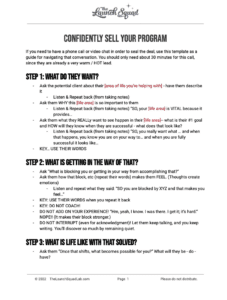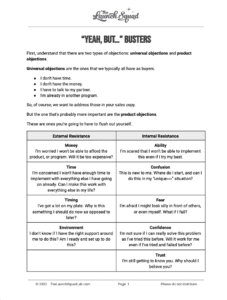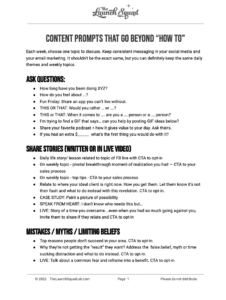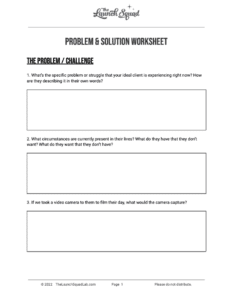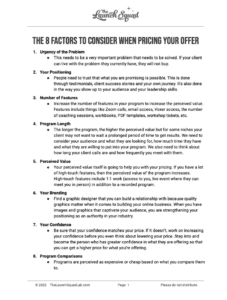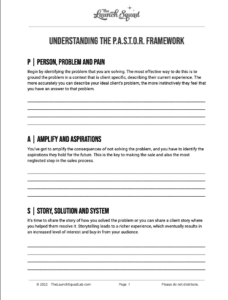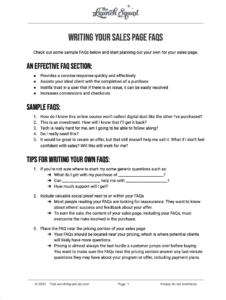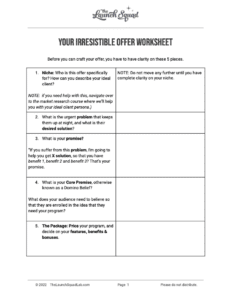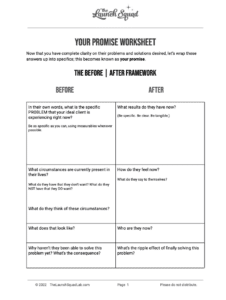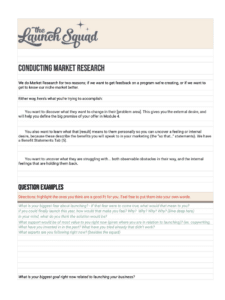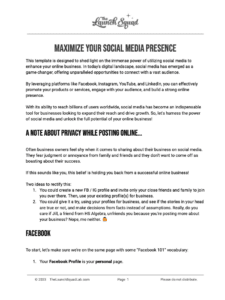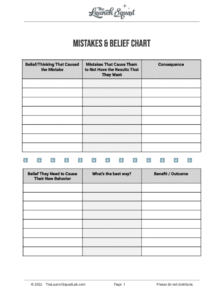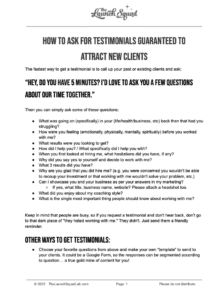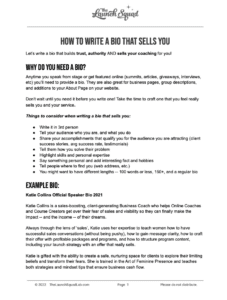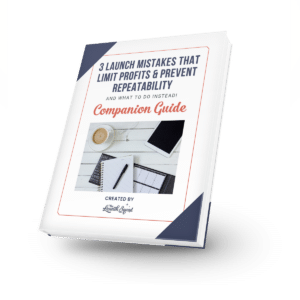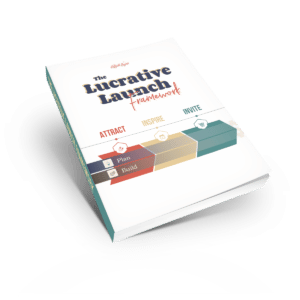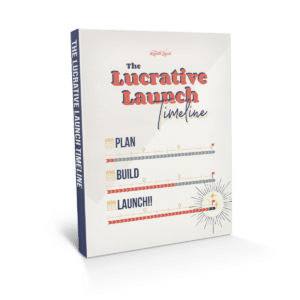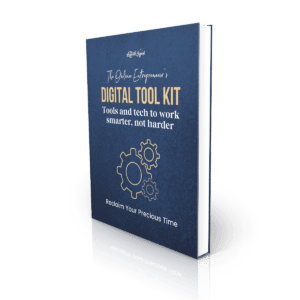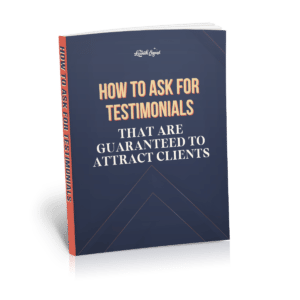Think of her as your ever-patient, empathetic, and resourceful tech translator who geeks out on helping you to find and use the right technology systems to bring your stretch business goals within arm’s reach.
Documentary “Click the Link Below” (Coming in 2023)
[00:00:00] Jeffrey: Welcome to the light and your launch podcast today, we're talking about overcoming the overwhelm when it comes to making informed decisions about technology. Stay tuned.
[00:00:57] Jeffrey: Welcome back to the show. I'm Jeffrey summer. I'm back again with Katie Collins. And today we want to talk about that decision fatigue we get when trying to choose the right technology on which to build our business. Our business is no joke. It's no trivial matter. So making these decisions can be important.
Katie, tell us who we're talking to today.
[00:01:22] Katie: Our guest today is a passionate and compassionate champion of entrepreneurs, founders, and businesses. Her earlier career days were spent with multiple large scale public self sector projects for the city of Portland affecting more than 50,000 businesses and handling millions of dollars. She has more than 25 years of experience in executive leadership, marketing and strategic project planning, a natural teacher and gifted speaker.
She coaches. Runs workshops and gives presentations on a wide variety of topics germane to improving business leaders, soft skills. She uses her extensive business system experience and project design know-how to dramatically transform your marketing operations from a time-suck mysterious money pit into a Primo business building asset.
She's the co-founder of epiphany. Creating short form courses to guide business leaders through sticky marketing and finance decisions. She's also the founder and co-host of the women conquer business podcast, which shows listeners how to slay marketing, overwhelm, streamlined processes and amplify your impact.
Think of her as your ever. Empathetic and resourceful tech translator, who geeks out on helping you to find and use the right technology systems to bring your stretch business goals within arms reach. Welcome to the stage. Jennifer McFarland.
[00:02:53] Jen: Hey, thanks so much for having me.
[00:02:56] Katie: Yeah, we're so glad to have you here. And as I said, this is like one of those podcasts. I could probably walk the dog and nobody would notice because you and Jeffrey are birds of a feather. Very similar.
[00:03:10] Jen: you have to, you have to stay here. You're the one who's going to be like. Uh, you guys are starting to talk in ways that no one else gets. Can we get back to.
[00:03:19] Katie: right. I'm going to.
interrupt and be like dumb question number 50.
[00:03:25] Jeffrey: You'll be the, what does that mean person in the, in the group?
[00:03:30] Katie: yep. Yep. Sometimes we have to tell Jeffrey, slow the tech speak with the clients. knows what the F you're talking about.
[00:03:42] Jeffrey: Well, let let's start there. Let's start there. You like, why, why is tech so overwhelming for entrepreneurs? Like why is that? Why is that a thing?
[00:03:52] Jen: So. Let me just back up a little bit. I was actually the tech translator in these really large scale projects, which means I was supposedly the normal one who was taking what the customers wanted and running to the developers and saying, okay, here's what they need. And then talking to the developers into actually doing it because sometimes developers say that's too hard or we can't make that happen.
Why do they want to do that? They should just click on that other button, even though nobody's clicking on that button. So that's kind of where. Came into tech from, I was a marketer for like 15 years. Went into the peace Corps, came back, started a whole second career. Tech project management, developing a bunch of apps, but marketing always came into the picture at some point.
And so I think that then after I, my business, I was an accidental entrepreneur where I didn't realize people needed my skills in the small business arena. And I realized that I really liked helping smaller businesses and what I found and I found again and again, is that tech is so overwhelming because everybody knows that they need it.
But if you're just starting your business or you're. Um, not even a medium-sized business, a small business, it can be really hard to find access to the best information because there's just the access is sometimes it's really hard to get to. So people end up piecing things together and then it doesn't work.
Right. And they're super overwhelmed and they think, well, none of this is working anyway, why should I even bother? And then they just ignore it and it causes bigger problems than hassles in their business.
[00:05:24] Katie: yeah.
[00:05:26] Jeffrey: yeah.
[00:05:26] Katie: Yeah. I w a lot of what we see is people, um, you know, they made choices with their five-year ago self and they resist change, but then, but then they tell us, oh, no, well, that's a great idea, but. Doesn't allow me to do that. And Jeffrey and I are like, then change does.
[00:05:51] Jen: Well, it's
[00:05:52] Katie: people feel an affinity to who they hired in the first place or what they bought, you know, they're like, I'm committed to this system and we're like, but it doesn't work for you.
[00:06:00] Jen: Yeah. You know, I mean, and, and that's the thing that people understand. It's just like goals, right? As soon as you reach your goals, guess what? It's time to set another goal. You don't just sit there on that same goal. Otherwise you're never going to continue to achieve. And it's the same thing with your tech.
And I think people are resistant because they have this sense of pain about what it meant to do it the first time. So they're like, well, I don't want to go through this pain again. And then they realized by working with someone like me or somebody like Jeffrey, that it doesn't have to be painful at all.
You just have to talk to somebody and communicate about what you need and people who know what they're doing, know how to go find it. And that's what a lot of my education is with people now is around like, look, you just need to like talk to the right people who aren't just selling their one widget or their one way so that you can get the solution that best fits what it is that you're trying to accomplish.
The other thing that happens a lot. I think when people start is they don't really know what they want to accomplish, so they just get whatever. And then when they have more clarity around what it is that they want, they don't realize that they need to change the infrastructure around it so that they can.
Do it with ease or streamline it or make it better. Um, because really tech is just supposed to be a support system for your business. And too many people end up focusing on it way too much because it just doesn't work. Right. It doesn't do what it is that they needed to do.
[00:07:21] Jeffrey: I'm curious, I'm curious your thoughts on, um, like those all in one platforms, like a good job or a Kartra and things like that. Like where do you stand with those?
[00:07:33] Jen: Uh, in general, I'm not a big fan because, and the reason why is you want to go and, and, and there's a caveat always, right? In general, you want to go with the best in class, in everything so that you are getting the email marketing. That's the best email marketing that you can afford, that you're getting the best website platform that you can afford.
Um, as long as it all works together, like Kartra might be great at some things, but I've taken a course on Kartra and I think it's a terrible experience for somebody who's taking a course as the user, not as somebody who owns Kartra, um, you know, there are other platforms that are much better. I feel the same way about Kajabi.
They limit the number of courses you can have and the number of people. And it can be backbreaking in terms of expense, um, for that all-in-one, and you're also going into bed with somebody who might be really great at courses, but not really great at the email marketing. Um, you know, podia is kind of like that.
Um, but that's not to say that you shouldn't use podia because it's really great for other things. So there's really no perfect. All-in-one. And it can be really hard from a position of growth. So it's really about finding that. Sweet spot among a host of different things. Now that said the problem that some people have is they don't really, they're not really good at integrations.
So they end up with a lot of sites systems. And so the alert can be to go into an all-in-one and you just have to realize the limitations, like if, if this is what you can afford, and it does like. And you're going to, you're committed to learning it and managing it. And you think it can get you through the next few years.
Like maybe that's gonna work for you. Um, I don't go into a project with a lot of preconceived notions except that I really don't like Wix and, you know, a couple of things that are just, again, it's mostly because they're just not good for business, you know? Um, don't buy ads on Yelp. I mean, there's just a handful of things that for me are like a hard pass.
Right. And then
[00:09:34] Katie: don't ever give Yelp your phone number.
[00:09:38] Jeffrey: these are like golden rules of
[00:09:40] Katie: never stop
[00:09:41] Jen: Yeah. I mean, there are just some things that I'm like, you know, that I don't, these are not good ideas, but then there are other things like that, that I, you know, that I'm, you know, I have a client who's on Kajabi and she loves it. And then until she doesn't, and then she's like, it doesn't do this thing.
And I was like, yeah, we talked about that. You know? And, but it does all of these other things. So it really just depends on. The individual person. Um, my job is to sometimes work with what it is that people have and help them maximize it more than recommending. Um, but if I'm talking to a new business owner or somebody who's coming to me and wanting to redo things, a lot of times I'm like, okay, what is your readiness?
How techie are you? I have all these factors that I feed into it before I decide. What should happen next? And most of the time, it's not an all in one, but there are certain people and certain situations where that might be the best, the best solution for them. And I'm not going to discount it.
[00:10:40] Jeffrey: Now, what, what kind of situations would you recommend? An own one?
[00:10:48] Jen: Dang it. This is like, this is hard. Cause now I'm like, well, not none, but that's
[00:10:54] Jeffrey: I mean, there's, there's gotta be one, right. But.
[00:10:57] Katie: Let's let the dumb tech person perhaps answer that because what I hear from people who choose it, and I personally don't think they're financially ready for it. Like they're choosing a $300 a month platform and they haven't gotten their first sale. For example, I don't think they're ready, but they're like, well, the reason why I chose it is because it's because it's all in one.
I can build my website on it. I, you know, like it's just a one-stop shop and it feels easy because they don't have a tech person on their team. Um, they might not even have a VA. And so that feels easiest to them, even though that may be a way to decision factor. It probably shouldn't be the only decision that you're making is what I learned in leadership is like, the decisions that you're making today should be from your future self, not your current self.
Um, and so your future self will have a team that can help with that. And, you know, maybe that's why they're choosing that $300 decision because that is their future self, even though their current self isn't making money. But, um, Yeah.
just understanding that 300 a month. For the rest of your life in your business, think of how much money that is versus hiring a person on your tech team.
Right? Like I keep wanting to say put 300 bucks in a savings account until you have enough to hire a tech team.
[00:12:18] Jen: Yeah. You know, and, and it's interesting, like people and people make those decisions for, um, what I would say are some of the wrong reasons. Like they might be like, well, Brendan Bouchard uses Kajabi and that's my future self. So I'm going to do that. Or I love Russell Brunson and I'm going to go all in on $300 a month, click funnels because it'll do all of the things. And then you learn that it doesn't do all of the things. Um, and in the case of ClickFunnels, um, it's really hard for people who are not technically oriented. Um, there's a lot of bugs and stuff, so it it's, you know, but if you are say a course creator and you know, you're going to have like four or five teachers and.
Want, you don't really care. If you have a beautiful website, you know, maybe you could use teachable and use that as your beat, your starter website, and you can get in and start making courses and selling them. And as a program you can grow into, and then when you're ready, you know, you can have that other website with fancy funnels that lead into the course.
Like that would be an example of like a best in class platform that does courses. That's all you're going to do. And now bundles with coaching. You could do that. And you could get by for a long time and it starts at free and goes up from there. So, so that would be an example of an all-in-one that I would pick, but I don't really tend to pick the really hot, like all in ones, you know?
I mean, there are even some businesses right now who could get away with all in one. it builds landing pages. It does websites. It does their email marketing. They don't need anything fancy it's budget friendly. Um, and it will do everything that they need and, and that might be enough. Like, and, and so that's the thing about the all-in-one, it's all. in terms of what people need. Um, but in the beginning, yeah, don't saddle yourself with $300 a month. Anything cause you don't need it. It's it's like the people I met when I first started, um, and they would go with infusion soft out of the box. It's now called keep.
[00:14:22] Katie: Yeah.
[00:14:23] Jen: And it was like, you know, a couple thousand dollars for them to onboard you.
Well, if you have like your mom on your email list, you don't really need to be onboarded. And then it was at that time, it was like $300 a month. And it's like, well, you know, you're emailing your mom, dude. Like you don't, you don't need, you don't need all that. So, um, so you have to be careful with that future self-talk in a way, because.
You also can't bust your budget. Like you said, Katie, you have to like understand where you're at today and then you just position yourself for growth. And that's why I tend to recommend enterprise grade products like teachable is used by enterprise. Companies, uh, MailChimp also a lot of products out there being used by really large companies, whether or not they should is something else to talk about.
But if you go with those kinds of best in class, you know, you can grow into it. And then if it doesn't do something later that you need, you always have the option to move. But if you start off with something that's really limited or maybe too expensive, I mean, you're always going to be frustrated and that's not the place to be as a business owner.
Right.
[00:15:26] Jeffrey: Let's talk about moving off. Like, I know that's kind of a really big limitation, or even not even a consideration for people who are like, they may have gotten into a software platform and they're like, man, this just doesn't do it. This is hard to work with. Um, you know, I didn't check my options at first.
Like how do we, how do we get over that hump? Like, okay, I am biting the effing bullet and going somewhere else.
[00:15:55] Jen: You know, I mean, what's that quote like it's like when the, when the pain was at the price of pain is greater than what the cost is to change. I mean, it's something like that. And you do have to have a breaking point where. You have to realize that you're running a business and if you are spending way too much time doing things like double entry, if you can't get the information out of the system that you need in order to be productive, what you're actually doing is creating a barrier to making money.
I mean, You know, you don't want to do that as a business owner. You want to maximize your time. You don't want to spend your time fussing around or never updating things, which happens a lot too. You know, there are all kinds of people who don't update their email list ever because it's like written down on scraps of paper back when we were doing in person events, you know, or you know, all different kinds of things.
And then. Like that keeps you from actually achieving your goals. So I think that you have to be as a business owner really protective of your time and realize that when you move off of something, you know, you need to probably hire somebody to help you for that and bite the bullet one time so that you can reap the benefits of a system that serves you better.
[00:17:10] Jeffrey: Yeah. I love that. Now. W what about like, uh, the idea of. I hear you that you won't that recommending an all-in-one platforms. Probably not the best solution I'm onboard with you. They're there to, I. If you've ever tried to build a sales page and Kajabi you've realized right away, it's not the right platform.
Um, but I digress. So what about this other side of things where we're now piecing together all of these other pieces and like that in itself is overwhelming. Like how do you know now you're suddenly presented with like, Three or four options for a website, four or five options for an email platform for six or seven options for a cart checkout system seven or eight options for like now it's just now exponentially more overwhelming.
What do we do then?
[00:18:00] Jen: Right. Seven or eight. I laugh in your general direction. Uh, you know, the, the MarTech chief, that's like one of my favorite blogs talking about super nerd, you know? So that's like marketing tech, chief, you know, he does a thing every year and I think it's up to like 8,000 different tools for marketing your business that are available.
So no wonder people get overwhelmed because there's too much junk to choose from. And. Piecing it together as like a nightmare. I mean, I think that that's why when I go speak to groups and I can see them, especially now that, that we're doing things remotely on zoom, they lean in so close to the screen.
When I put up my integration slides, like I'm like, if you are a consultant, here is your starting point. And they're all just like way like in there, you know? Cause I give them like the, you know, I'm like this integrates with this and this integrates with this, you know, and I give them like a basic setup, you know? they're all just like, oh, you know, and I think that again, it's about, I tell people to do piecing it together with intentionality. You'd never add anything new that doesn't work with what you already have, because then you're just breaking the system and you're going to be in a bad place. And. Always look at how the pieces fit together to make sure that you're maximizing it.
I talked to a lot of people who have like three programs and they're each, they all do the same thing, but I know how to do it in this one for this thing. And this one for this thing. And they're costing themselves sometimes hundreds, hundreds of dollars.
[00:19:27] Jeffrey: Yeah.
[00:19:28] Jen: So I would say that it can be difficult, but part of it too is as business owners, you need to like hold your nerds to their feet, to the fire, make them.
Draw it out for you make them create standard operating procedures. So you know what to do and how to manage it. If they're handing it off to you and make sure you understand these integrations. So you also know when something is going wrong, that said. If you're doing it on your own, you know, there are people out there who, who are speaking the gospel.
Like I am like all over the place trying to get people into systems that make sense. And that's where I think people go astray sometimes as they start reading all the blogs and they start crowdsourcing for information on social media. Honestly, there's a lot that you, a lot of times you just need to hire somebody and talk to someone who can really help you instead of doing what your buddies doing.
And,
[00:20:24] Katie: Oh, I shouldn't, I shouldn't go to Facebook and say, Hey everyone, which calendar system do you use? Or where should I build my website?
[00:20:35] Jen: No. I mean, a lot of people, I mean, a lot of people do that,
[00:20:40] Jeffrey: Unless you're in the right group, I guess.
[00:20:42] Jen: right, you have to be in the right group and you have to be among people that you trust. And, you know, and I. I built an entire class around this, about how to find the right marketing tools. And a lot of it is about, you have to be so clear as a business owner about your own goals, that when you just crowdsource, you don't know anything about, and you have these other people, like they, they, they, they, they
[00:21:04] Katie: Their model
[00:21:05] Jen: you their thing,
[00:21:07] Katie: Right,
[00:21:07] Jen: yeah.
Or you, they have a totally different business model. Like it doesn't make any sense to be asking anybody. And your friend who may also be, um, like for example, I'm a marketing coach. I will not do what many of my colleagues do. I am just diametrically opposed to a lot of the methods. I don't email people every day.
You know, there's a lot of things going on in my environment. Yeah, no, I'm not going to do that. You know? And, and I think everybody feels that way within their own field. And yet when it comes to tech, if it's not your lane, if it's not where you feel comfortable, people tend to think, well, I'll just do what they're doing.
Um, and they forget entirely that misery loves company. Like sometimes what they're using is so crummy and yet they're like, well, we still have someone to commiserate with. Like, let's talk about dub Sato all day long. Are you with me? Like, you know, it's just, it's unbelievable. And dub Sato is not, I don't, that's an all in one that I don't really like.
Um, and it's a really popular, like it's similar to what, like 17 hats and some of these other like CRM programs that try to like, do everything. Um, just an aside for listeners who are like, what stub Sato. Yeah, no,
[00:22:19] Jeffrey: they're all Googling it right
[00:22:20] Jen: that. Yeah. Googling Tufts. How-to yeah.
[00:22:25] Katie: all right. I'm like, okay, do we have to keep talking about tech?
[00:22:29] Jen: No. Talk about whatever you want.
[00:22:31] Katie: I'm just giving you guys shit. Um, no, but I, I wanted, um, you know, Jen, before the show, even I was telling you, I mean, so for the listeners, Jen and I have known each other for years, we might've met, I don't know, 20 15, 20 16
[00:22:49] Jen: I think yeah.
[00:22:51] Katie: it felt like we met sooner than that, but anyway, it doesn't matter. Um, and so, you know, you, and I've seen lots
[00:22:55] Jeffrey: say back in the
[00:22:56] Katie: of each other.
[00:22:57] Jeffrey: because back in the day,
[00:22:58] Jen: Back in the
[00:22:59] Katie: Um, but Back in the day. you know, when I actually, so when I hear the word productivity, I always think of you. So I don't know if. If you taught that, or you just were so frustrated people who have no idea how to organize themselves, um, you and I share the similar, like grammar police, please use the Oxford comma, please use appropriate capitalization.
Right. So we're old school like that, you know, I think they call us, Um, gen X, gen Y whatever we are. I don't even know.
[00:23:28] Jen: yeah, yeah. I'm also a recovering English major. I mean, my bachelor's degree is in, is an
[00:23:33] Katie: Oh, yeah, I'm a recovering English teacher, so
[00:23:36] Jen: yeah. So I can't help myself.
[00:23:38] Katie: right, right. So, so anyway, I do always think about you with productivity and I see that you do still talk about it a lot. So I'm curious, like w on the thread of technology, are there some productivity apps that you like, are there some that you don't?
I mean, I have been in, um, on T I do sales for other people sometimes, and I've been on sales teams that have used, for example, a Sama. In this huge convoluted way. Jeffrey was in there with me, like, why were they doing it this way? And I'm like, I don't know. I don't know, but they didn't hire us to do. Right.
Like they just hired me to do the sales thing. So like, I want to revamp their whole system, but I won't, you know, so I, I love the sauna for certain things, but I didn't think it was being used in the right way. Um, so yeah. I'm just curious. What are some apps you love? What are some apps you hate? Um, and how should we use them So, that they're appropriately used.
[00:24:30] Jen: First I want to say it's really interesting that you think of me and productivity, um, because I've never been like, I think it's the. You know, I did business process improvement at the city of Portland and I was an executive and everything was about getting everything done as quickly as possible and out the door.
So we were always trying to look for duplicated processes, different ways that we could do serve our customers as quickly as possible. And so I think that that's just a part of what kind of is baked in is like, if you're a project manager, you're like, let's get this project done, you know? And it's part of just the way of being. When I was managing large teams and big projects, I mean, we would use like Microsoft project, which I hated, but like it managed dependencies and it kept people off my back. Honestly, it wasn't for me, you know? Um, my still favorite. Project management software is not project management or productivity software at all.
It's just Excel like, and I can manage tasks and all different kinds of things in there. So like a spreadsheet like Google sheets and things like that. Um, people don't like to hear that, you know, because not everybody like, you know, people want the fancy tool. Um, some people really do love those Kanban boards, like in a sauna or Trello or, you know, pick, pick your let's drag it from, you know, to do, to done.
Program. Um, I think that the productivity tool that works is the one that you actually use. Uh, I tried to use different tools like Monday I've used things I've used, um, uh, sauna, all different kinds of programs. And you know, the ones that stick are the ones that are the best for your organization. Um, and it really just depends, you know, on how much collaboration you need to do.
Um, and my business partner for apifany courses, it doesn't like any of it. So we're still trying to figure out what we're going to do. And I think that for us as a team of three, uh, I think it's really coming down to just being a. You know, things like Google docs and stuff like that to manage things in the beginning.
And then, um, as we continue to grow, certainly we're going to have to find another way of, of being. And I think that that's, that's really what it is. So whatever you use to manage, getting work out the door, it is. The, the one that you use is the best one, but please, for the love of Pete you something, and then also standardize and operationalize what you do with standard operating procedures, checklists, anything that you can do to work through your work as quickly as possible.
Those are the greatest productivity tools of all is when you're standardizing, how things happen. That's how, you know, if you've ever read the. That's what it means when you create the gold standard, like you were having a repeatable process that you're doing over and over again, because you have a checklist that says, this is what my customers expect.
So I am going to do that, you know? And then if like I get hit with the Crosstown bus, the next person who is taking over the Jen McFarland role, God, God, rest her soul in, in a business at least can pick that up and like take it and run with it. Um, and that's really what seems to work the best is like, oh, I have to.
Done like, here's exactly how I do that and, and publish that. And those are the things in your marketing or in any type of task in your business that can really launch you forward. It's not an, a sauna board that like people stare at with like tasks that nobody's doing. It's like, whatever it is, that's going to make them work, move as quickly as possible.
[00:28:02] Jeffrey: Here's here's something I want to chime in here because I love that you said, uh, you know, a spreadsheet because don't use a spreadsheet and I, and I have my opinions about software. I think what you're, what you're touching on is a really, really powerful approach to management and task management and productivity, because for me, what I'm hearing, and I would agree with this, that, Sometimes those fancy a sauna click up a task management tools.
They want to help the business owners so much that they inhibit the business owner from fully understanding what needs to be done and how it needs to be tracked. Like if they say, oh, we've got these amazing business templates, you just click this button and all of the boards and tasks and stuff are created.
Why, why are they created that way? And what I'm hearing is like that first step of creating a spreadsheet is way more about understanding why things are in this column. Things are in this row, things are attracted this way and that way and whatnot, like knowing why I think is way more important than. W what platform it's on.
So I'm glad you said that.
[00:29:34] Jen: And I would say that click up is another one that I tried and, you know, you can spend a lot of time. You can waste a lot of time. Configuring all.
[00:29:44] Jeffrey: Oh yeah.
[00:29:45] Jen: and searching for the right platform and doing all of that. And guess what you've done, you've wasted so much time thinking about something that is supposed to make your life easier when you should just go do it.
Like, and, and I, I talked to a lot of people that just need, like the fire lit under their butt, like that. I'm like, whatever it's going to take for you to just start. Doing that's what you need to do. And it has nothing to do with software. Software is people, people don't understand. Software is not a panacea.
That's going to fix everything that's wrong in your business. It can make it worse and it can make it better. But the only way it makes it better is if you have a solid understanding of what it is that you're doing. And the only way to do that, I'm sorry. It can be a pen and paper. It can be an Excel spreadsheet, but you have to work through that stuff before you start getting all the nerds.
[00:30:36] Jeffrey: Amen.
[00:30:37] Jen: we'll do what you say, but you gotta be sure.
[00:30:41] Katie: Well, okay, so I've got a couple, couple of things stacking up here in my brain. Um, one, when you hire someone, they will do what you ask and you may not be asking for the right thing.
[00:30:54] Jeffrey: Yeah.
[00:30:54] Katie: Um, so that's huge. Uh, another thing I just want to really shout out to you, Jeffrey, like how good you are at. Um, just making everything into an SOP or standardizing things or knowing how to automate or whatever and making things easier because even we just did the summit.
And, um, I mean, I, I flailed with technology till Jeffrey came into my life. Literally it was like the biggest bane of my existence, which is why I always liked to talk about these topics, um, as the dumb
[00:31:27] Jeffrey: dying flesh fish out of water, just
[00:31:29] Katie: I, I, it was so frustrating for me. So many times, like ClickFunnels couldn't change the color, like, and then I even got Jeffrey to help me.
We could not for the life of us change the freaking color. And it was like, it just shouldn't be this hard. Right. So just, um, buggy stuff. But anyway, Um, so I'm in active campaign for, we are an active campaign for email marketing, but I've been using it for a while and I literally just kind of flailed around, right when I got it.
So I still somewhat piece together things in a Katy way, not in the, I know what I'm doing way. Um, and so, um, but like, you know,
so Jeffrey set up these templates to use in an automation so that it's, you know, it's day one of the summit here, or the speakers it's day two of the summit here, the speaker. I wouldn't, I wouldn't have known that I could've done that.
I would've done it in a Google doc and I would've cut and pasted every single time. right. So it's like my length of work. It's shortened because I have a partner that's helping with things like that. So it is so important. If you can work with a consultant or a mentor to help you. Be the engineer that you might not be right.
Like, I'm like a linguist. I really like, you know, all things, language. I am not a math person. I'm not an engineer. I do not think in that way. I hate writing SLPs. Um, but doesn't mean that they're not important. I just don't enjoy doing. Um, but it is so important. And how much time you waste explaining to a VA what you want done versus having an SOP recording a video, and anyone that steps into that role can go into that Google folder and do it right.
And people don't understand that. Like, I don't have time to do an SOP. I'm just going to go ahead and type out all these instructions
[00:33:14] Jen: No. And
[00:33:15] Katie: you know,
[00:33:15] Jen: yeah, I mean, you can, you can save yourself so much time by doing something once and showing someone the right way to do it. If you go back, if you don't train your people right, the first time, then you're wasting so much time retraining and redoing and, you know, getting to that spot that you wanted in the first place.
That's one of the reasons why it's really. To do that the first time, you know, make that part of your training, make that baked in. And then also it does mean that as the person who's hiring as the business leader, you need to spend a lot more time with who are these tech people that I'm talking to and, you know, are they really hearing me?
And, and that's really the key, you know, You know, you want to look out for people who are trying to talk over you. Like a good tech person is not trying to like stun you with their brilliance. They're trying to understand what is it that you need and how am I going to deliver it? And they should be talking to you like a human, you know, or have a right hand.
Person who's going to be there to, to help them understand what you're saying. Um, you know, a good tech person can share with you examples or give you clients that they can talk to that will, we'll talk about what the experiences to work with you. Uh, a good tech person can, can reiterate what the needs are and in a way that you understand and feel like you've been valued and heard.
And I think that these things. Are missing a lot. You know, I think there are a lot of people out there who are like, I can help you with your email marketing. And I do this one thing, you know, and we don't, you know, and, and, and, and there are people who are normal that don't do that. And we may not be as loud as the slick, you know, bro marketer out there.
Who's like, you know, blunt force marketing you into that one thing. And it's really important to do your due diligence when you're going to hire somebody to come and, and work within your business and help amplify your voice.
[00:35:20] Katie: Yeah. I love that. That they're really on your team for you and that you're not hiring them so that they can sell you. Right.
It's kind of like insurance agents. Are they a broker of several different places or are they selling you that company's insurance? You know, this is the best policy I have for you because I only have two, Right.
[00:35:41] Jeffrey: Right. And they're both affiliate links.
[00:35:43] Katie: Yeah, yeah. Right, right.
[00:35:46] Jen: Oh yeah.
[00:35:49] Katie: Hey, you know what? So.
I like affiliate links. but it is not the forefront of what we do. We don't even, you know? Yeah. It's,
[00:35:57] Jeffrey: That's not,
[00:35:57] Katie: to get
[00:35:58] Jeffrey: that's not really the get rich a moneymaker right there. It's cool to share them, but
[00:36:05] Katie: It's cool to get credit for, for promoting their business. Right. Like, I appreciate that. Um, but anyway, um, okay, so we talked a little bit about productivity. I wanted to ask, like how, how do you think someone can measure whether or not they're productive or not? Like, do you have any recommendations for like Jeffrey?
What is that tool you use where you can type like LS and it prints out the launch.
[00:36:35] Jeffrey: TextExpander.
[00:36:36] Jen: Yeah, it takes expanders.
[00:36:38] Katie: And then he's such a dork. He posted the guy posts on Facebook three times a year. One of his posts is how much time he saved by using text expander.
[00:36:50] Jeffrey: Ours ours.
[00:36:52] Katie: But what a great marketing tool they are literally managing. For you, why that was a good purchase. Right.
So anyway, that's where my head kind of went. Like, what other ways can we measure? Um, you know, I love and click up how you can time a task. You can get your team to time that task and see, you know, um, yeah.
[00:37:13] Jen: I mean, I love stuff like that. I think that, you know, again, um, here I am this nerd, who's like, well, there's some really low tech ways that you can do that. You know, I, I love time audits, you know, I think sometimes people just are not aware of how they're spending their time. Like, um, and I. Uh, you know, I, I told you before we started, I'm recovering from a concussion.
And so I have a program it's not on right now because we're recording that tells me every 45 minutes. So you need to go take a screen break, like you can't be doing this anymore. And it's been. Really kind of this weird, like kind of Pomodoro method of like, oh, what have I done the last 45 minutes? But now I have to spend 10 minutes away, you know?
Um, and for those of you who don't know, a Pomodoro is a method of working for like 25 minutes on one thing, and you are supposed to clear out all other distractions and then you take a, a break. Um, and you might think, well, I could do that all day. Well, try cause you can't, if you're not used to it, try
[00:38:10] Jeffrey: Yes, it's difficult.
[00:38:12] Jen: it's difficult, you know, to not get in your email, to not get in anything else. And I think that when we raise that awareness, you know, when you are sitting there with a piece of paper and every time you switch tasks, you know, in some sort of intentional way, you maybe have columns and you're just ticking it off.
Like I was on social media, like 85 times today. Well, is that, you know, do you have 85 reasons to be on social media or. People don't have that level of awareness around what it is that they're doing. That's inhibiting success. And I think that when we talk about productivity, it was really interesting. We just finished doing a four episode series on productivity and just for funsies, I went and looked up what productivity meant, and it really is very much about. long it takes to deliver work and so like a product or a service to somebody. And so if you just start thinking about things in that regard, trust me, you will begin to see ways that you can be more productive in delivering services when you start to just look at it that way. And you'll find that the solution really isn't necessarily an app or a tool it's that self-leadership, that you can be doing as a business owner to get through things in a different way.
And that's where you start to develop into that better leader and that better way of being. And it's also another reason why you'll start to see if you're doing all kinds of tasks that could be handled by tech. You know, tech is good for the mundane. It can do the repeatable stuff for you all day long, you know, and those are the things that you should be covering up with a tech, you know, not necessarily even a VA like tech can do that automation.
And I always say that automation. Should always be done so that you can be more human in your business. You don't do it so that you can be a bot. Nobody wants to hire a bot. You do it for the things that you hate to do over and over again, so that you can talk to your clients and you can do what it is that makes you the best you in your business.
[00:40:13] Katie: And that's what I always have mad respect for. Um,
th like when I sit there and think I hate doing this, I'm like, I must not be the only one and someone probably solved this problem. So let me write, like, let me Google the, the
[00:40:28] Jen: going to call Jeffrey.
[00:40:30] Jeffrey: Yeah, exactly.
[00:40:32] Katie: Um, you know, I
[00:40:33] Jeffrey: Katie, why are you keep doing that every time? What are you
[00:40:35] Katie: Right. He's like, if you would just listen to me, um, you know what I wanted to circle back around to one thing you had said was something about like tech, um, you know, like what did you say?
It reminded me of what I used to say about like tech doesn't sell your program. Your offer sells your program. Tech is the tool that allows you to bring in the money. But too many people I think get caught up in the, oh, I need to buy ClickFunnels. Cause then I just need one funnel. I'm one funnel away from being a $10 million person, you know?
Uh, and they forget the, Yeah. the, the importance of having clarity in their business and all that. So I forget what you had said
[00:41:20] Jen: Yeah, it's a, it's a distraction. So, and, and that's the thing about, you know, my idea about so many low tech solutions is like tracking your productivity. Like that can be a distraction. So make it low tech so that you can find what the actual gaps are and address those, um, do things in the easy way so that you can actually solve the problems that need to be solved too many times, people spend all like they'll, it's like they're. It's almost like they're thinking about making their bed for like three weeks before they actually get around to actually making their bed, you know? And, and, and like, it's like, just make your bed, you know, like it's, you don't need like a special person to like iron the sheets and then, you know, make the corners square.
Like you just need to make the damn bed because then you can move on with your day. And, and that's the thing about tech is sometimes people use, it's a stall tactic and the truth is you don't even need click funnels. You don't even need a website in the beginning to start selling you. Don't like, you don't need any of that stuff.
You're just making excuses. If it's keeping you from talking to somebody like, and I think that what I said is, you know, tech is the support for your business. Like, and that's what it is. It closes the gaps. But if you think tech is gonna fix everything, you're probably gonna make everything worse. Like before.
Better. And so that's the thing that you have to be really careful of. And that's why it's, that's why, like, I, I don't like the people who are like, you're just these seven secrets away from $1 million. Like. You can't cut corners on some of this stuff. Like there are some things that are really going to push you forward and really gonna help you get to your goals.
Um, and it's not usually the, the, the get rich quick stuff. It's the stuff that has been bugging you, but when you close that loop, then you can get to the next thing much quicker. And that next thing is, is the thing that's, um, giving you the money over and over again that you need to get to quicker.
[00:43:22] Katie: Yeah.
I love that. You said that, you know, the thing that's bugging you because I'm, I'm a big fan of, of using intuition in my business. And to me, like when you're bothered by something, it's your intuition going? could be better if you fixed that. Right. Or if you left that relationship or if you, you know, left this platform and went to a new one, like, and then it's like all of our resistance, but I'm not ready.
Right. It's like we have like an affinity to the platform as if it's like a boyfriend or, you know, it's like, it's okay. You can leave it. Um, Yeah. So I dunno. Anyway, it's.
[00:44:01] Jen: You know, I mean, I totally feel you I'm like, I, I just, I just launched a brand new website for women conquer business. I'm in the process of writing the, Hey you're welcome to the new women conquer business, you know, and I'm okay. I left WordPress, which was just like this whole thing, you know, like I had this thing about it.
Um, but then I realized I didn't want to manage two WordPress websites, like for two different businesses, you know? And I went someplace that it's, it's hosted and it's super nerd and SEO is baked in, um, And it's lightning fast. Cause it doesn't use all this other stuff, you know? Um, and do I recommend ghost to my clients?
No, but it works really well for me and it does what I need it to do, you know? And that's, that's what matters, you know? And, and it's kind of a. I finally learned in my own way that like I had to be my own coach and I had to like, do what was going to work for me. And I think that sometimes as business owners, we get really clouded around like, well, it has to be this way, or this is what other people are doing.
And it really just doesn't matter. Like, Like I just decided, well, I like the way that looks and that's what I want. And I'm totally happy with this decision that I made, even though I would never tell somebody else to do it. Like it doesn't, you know, for most of the people I work with, it doesn't pencil out like the decision method that I had for that.
Um, but. You know, you have to do as a business owner, what's best for you in that moment and then set yourself up for success in the best way possible. And I think that sometimes the way to do that is to surround yourself with other people. And those people may be very different from you. Like my background is a lot different from the background of most of the people that I help.
Um, but that's a good thing. You know, and the people that I hire, like my new business partner for epiphany courses, she's a CFO. Like, I don't know anything about finance. Do not ask me to add anything for you do any sort of financial, anything. Um, But she does it. So like, I can, I can be, and she'll be like, Jen, did you do the whatever?
And I'm like, I don't know what you're talking about is she? And she has to explain finance to me. And it's like the perfect partnership, because as much as I am a nerd, I'm equally like this weird content creator, like disguised as a consultant who just wants to go make stuff. Like, that's what I like to do.
I don't want to think about the money part. Um, I'm getting to where, you know, sometimes I don't even want to think about the tech part. I just want to go make stuff and. So it was good for me to have somebody who's like, yeah. Um, did you, did you send me your transactions? Oh, okay. Yeah. You know, um, so we all have people that we need in our life that are like different from us.
And, and I think that that's what you have to do.
[00:46:51] Katie: Yep. So Jen, I want to brag on you a little bit because I we're friends and not only that we're Facebook friends and I saw this cool thing on Facebook where you're like cool enough that people actually came into your home and set up a studio and you were interviewed For a documentary. So tell me more about that here on this podcast for everyone to hear.
[00:47:15] Jen: For everyone to hear. Um, so it's interesting, we've talked a little bit about ClickFunnels. I wrote a blog post about a year ago. That was, um, basically me venting about ClickFunnels. Um, because
[00:47:28] Katie: I read it. I did I, it was the title and I'm like, speak it to me, sister. I feel the same way and I totally read it. So
[00:47:35] Jen: Yeah. And so it
[00:47:36] Katie: link that blog post in the chair in the show notes. So
[00:47:39] Jen: Oh, you should. Yeah. And, and so, so, and I was like, you know, and, and it was basically said, you know, it works for some people, but you have to have a staff. That's not who they target. They target all their marketing and say like, you're one funnel away. And they go after like, like I I've been watching TV and I've seen a click funnels ad.
And it was for like a stay-at-home mom. Who's just, you know, starting a business. And I'm like, that is not the audience for ClickFunnels. Sorry. It's not. Um, it's super buggy. Did you know, you can't even add a coupon code natively? No, nobody needs that. Like, if you're going to have an offer, you need to be able to have a coupon code so you can offer a discount.
Like there's just so many things about it. And I have worked in it and worked in it. And it's frustrated me and I've pulled people off of there because they couldn't afford the $97 a month, let alone the $300 a month package. So I wrote all of this out in just a very honest way. And then I SEO the heck out of it.
Like I just spent all my time and energy on like, how can I get this thing to rank? And then I forgot about it. And like I said, it was about a year ago. And so sometime around. The beginning of the year, I get this like random LinkedIn comment. And I was like, is this for real? You know, and his name was, um, Magnus, scat volt.
And he told me that he was a Norwegian documentary filmmaker and that they were making a movie about, um, digital. Called click the link below. And they wanted to interview me because they found this article that I had written about ClickFunnels. And I was kind of like, is this for real? Like, you know, cause this stuff has happened to me before I write a lot.
And you know, my podcast got picked up by, uh, a. Company in Belgium that does courses for corporate. And so like, I get like, you know, residuals from old podcast episodes. And like, if I had said no to that, like I would not be getting checks for like old podcast interview, you know, all kinds of like old podcast episodes.
And so this email comes in and I'm like, oh, I don't know if this is true or not, but like, I'm going to go research this guy. So I found out that his name met up with. Website. And he had actually done films. And the picture on the LinkedIn looked like the picture on the website. You know, I was doing all my research, you know, so then I was like, sure, I'll talk to you.
Why not? You know, back in LinkedIn and stuff. Um, and so we talked on zoom and he seemed like legit, you know, and invited me to watch his documentary, which I did. Um, it was very good. And, um, And then he was like, look, we want to have you on, because we read this ClickFunnels article and we're going to be interviewing all the people who do.
Like internet marketing and we want you on as the voice of reason. And I was like, well, okay. You know, so they're going around. They're like interviewing like Russell Brunson who owns ClickFunnels and all these other people. Um, and then they come to talk to, um, you know, Middle-aged white lady sitting in her living room saying, well, actually you don't need a funnel. me explain why, you know, everybody's first funnel is how you get your customers and deliver services to them. You don't need fancy internet for that. Um, you know, and so that's what the documentary was. It's called, uh, click the link below. At least that's what it's called right now. And it won't be released for another year.
So I don't really know a lot about it. Um, they talked to me for like an hour. Asking me all different kinds of questions. A lot of it was describing terms describing what internet marketing is, some of the pitfalls of it. Um, some of the really good parts about it. And, you know, I mean, it's high risk because here I am, like the contrast is going to be quite great, you know, uh, between me and maybe some of these high flyers are going to be talking to. But if you don't take those risks and go in and speak your truth, then nothing ever happens. So, um, so that's what happened. I'm like really excited and really nervous about it. And I feel like having done that, even if one person is like, you know, maybe I shouldn't go down this path. Maybe it's not time for me yet.
Um, then I feel like I've done my job as somebody in this documentary.
[00:51:58] Katie: Yeah,
Awesome. Well, and I want to read like, um, when you were posting about it, you know, when you posted a screenshot of a message you got from them and they're like, we're looking through the interview, man. It's so good. You really did a fantastic job explaining. Complicated things in a very understandable and intellectual way.
We're so amazed and thankful. So that is just so cool.
[00:52:21] Jeffrey: super
[00:52:22] Katie: probably, weren't going to read that on this podcast. So I thought I would,
[00:52:25] Jen: No, you know, it was just a neat experience. And then like, if, um, I think Jeffrey will like, appreciate this, you know, the guy comes in, so they have, they had a local filmmaker come in because they were, they were actually in Texas and they couldn't make it to Portland. They had all kinds of problems so that a local filmmaker come and he's like setting up all this.
You know, in my basement. And I was like, okay, maybe I'm a little too tucked out. Cause I was like, I have that microphone and I have this lighting and I have the, you know, and I was like, wow. You know, so, um, so yeah, you can over tech and I, and I think I have, I have, um, you know, my own tech and app stuff that I like to overdo, but it was a
[00:53:03] Jeffrey: believe, I don't believe so. I don't believe so. No, you can't overtake.
[00:53:08] Jen: we we're friends now.
[00:53:09] Jeffrey: we're
[00:53:10] Katie: Oh, my God seriously. It took him probably about a year before he convinced me to get a second monitor. I just was working on a laptop and he was like, for the love of God, move out of your 14 and a half inch laptop and get, you know, so I finally got like a second monitor and now that I'm moving offices and I have more space, he's like get a bigger desk and get a third monitor.
And I'm like, do I need a third monitor? Like I'm not a graphic designer or anything. He's like, you need it.
[00:53:35] Jen: Yeah. I don't know. I've been looking at these like big curved monitors that are like, you know, the one like $5,000 monitor, which if I came home with that, my husband be like, uh, girl, what are we doing?
[00:53:48] Jeffrey: like, do you know how much better I could work with all of this real estate?
[00:53:52] Katie: talk productivity. I'm going to work less. I'm going to work faster
[00:53:59] Jeffrey: Hey, that's no.
[00:54:00] Katie: it.
[00:54:01] Jeffrey: That's no joke when we're talking productivity more visual real estate allows you to see more at the same time. Like there's, there's some real, anyway, I can go down that rabbit hole
[00:54:14] Katie: it's true. It's true. I
[00:54:15] Jeffrey: I'm going to be like, I'm going to say I should sell monitors. That's what I should do. I should sell monitors.
[00:54:21] Katie: I bet we could get you an Amazon affiliate link if you'd like.
[00:54:26] Jeffrey: That's.
[00:54:28] Katie: Everyone that knows Jeffrey as the same Acer monitor.
[00:54:34] Jen: I have one maybe.
[00:54:39] Katie: well, Jen, this has been awesome. Thank you so much for coming on. And I think this was just, you know, number one, informative, number two, entertaining and number three fun for the three of us. So I'd say we got it in the bag.
[00:54:53] Jen: Thank you so much for having me. This has been really fun and, um, yeah. Yeah. Anytime I love talking about this stuff.
[00:54:59] Katie: Yeah.
All right. Well, we're going to put that blog post that went viral and got you on a documentary. We're going to put that in the show notes. Um, do you also have a free gift? Do you want to give away to our listeners?
[00:55:11] Jen: Oh gosh. A free gift. So there's a couple things. So I we're in the early launch phase of epiphany courses. A free course available called three mistakes podcasters make, and it really goes into some of the things, some of the things we've talked about, but specifically for podcasters when they're starting off with their podcast.
Um, and then also, yeah, just cruise over to women, conquer biz.com. Uh, that's where a lot of my marketing commentary is, um, the podcast, all different kinds of things there. Pretty excited about the new website too. So, um, but yeah, check out that course. Um, and that's at epiphany courses.com. Um, and then under courses, or you can look at courses on women conquer business.
It's both in both places.
[00:55:54] Katie: we'll link it in the show notes as well. So we'll get your website in there and all that stuff. So you're amazing. Thanks for being here. We will definitely have you back again. I can't wait to see the documentary. Um, so we can update our show notes a year from now
[00:56:09] Jeffrey: Right.
[00:56:10] Katie: where the link to the documentary when it's out.
[00:56:14] Jeffrey: Awesome.
[00:56:15] Katie: yeah. Any final words before we consider this complete.
[00:56:20] Jen: No, I'm so glad to be here. And everybody out there just really put some thought into your tech and, you know, find trusted advisors for that. No matter who they are, find people who will really listen to you. It's so important. So, so important. So please do that.
[00:56:36] Jeffrey: Yeah. I think if anyone just takes one thing away from this episode is no matter where you are in your business, find someone who's into tech. Like just find a buddy who's into tech, a system thinker, and like get them, seek that advice, seek that, that advice.
[00:56:54] Jen: Absolutely. Yeah.
[00:56:57] Jeffrey: thanks so much for joining us. This was fun and illuminating and I can tech talk tech all day.
So we'll, I'm sure we'll be in touch,
[00:57:06] Jen: Well, you have time after this. We'll be here till midnight. Um, just, you know, offline.
[00:57:10] Jeffrey: Let's just keep recording everybody. No gems.
[00:57:12] Katie: Like this girl has a dinner date.
[00:57:18] Jeffrey: Awesome. And thank you dear listener for joining us. And if you enjoyed this as much as I did head over to wherever you're listening to this right now, hit that five star and leave us a review and subscribe. And of course you can check out all the show notes and how to connect with jen at thelaunchsquadlab.com forward slash episode 70.
We'll see you next time.
Be the first to know
Enter your name and email and we'll let you know when new episodes release.
About the Show
The Lighten Your Launch Podcast is for Coaches and Course Creators who want a lighter online launch experience. Maybe you’ve done a few launches already, and feel exhausted just thinking about it! Or, it’s been one of your goals, but you don’t know where to start.
Tune in to learn from our team of experts, The Launch Squad, who aren’t afraid to dig into all aspects of launching: sales, strategy, technology, mindset, funnels, and even a bit of woo to get you through the toughest times. Let’s put a stop to perfectionism and procrastination, and finally take your launch from intimidating to money-making!

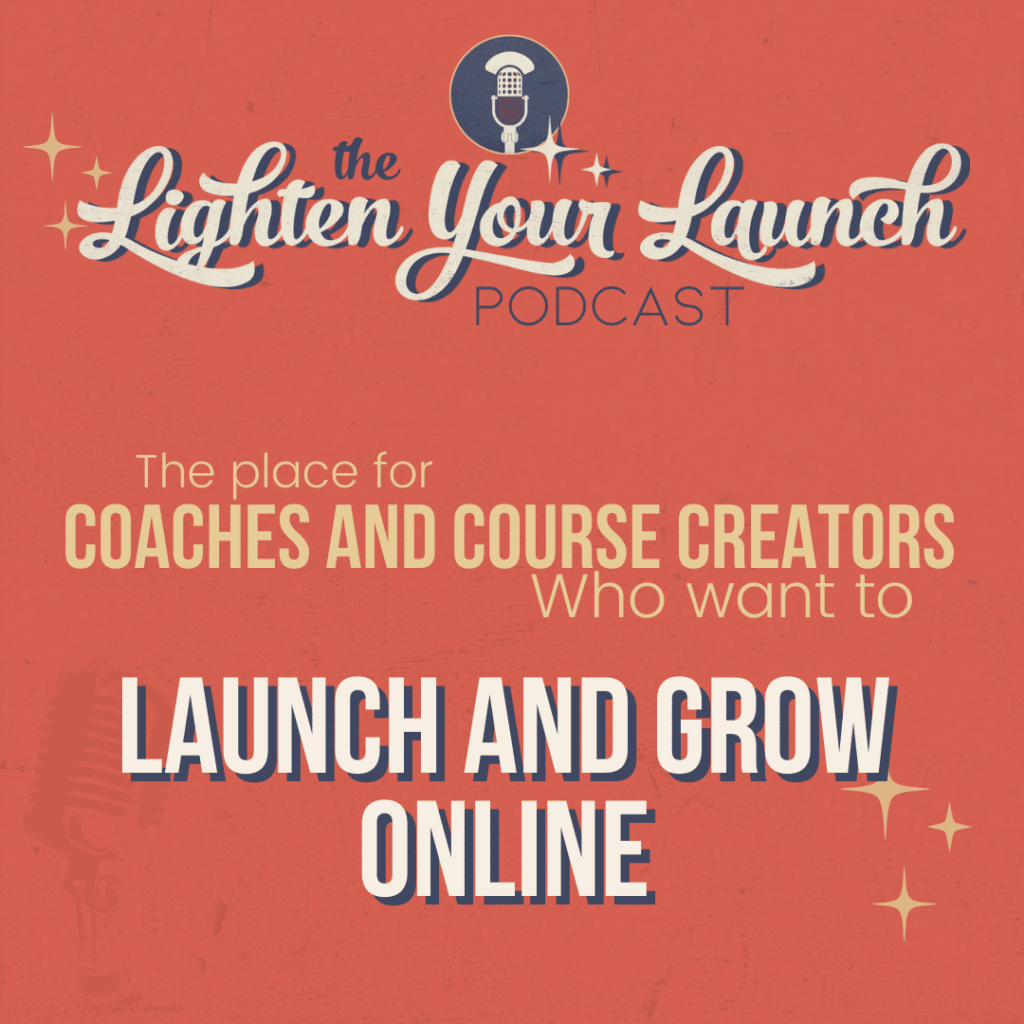
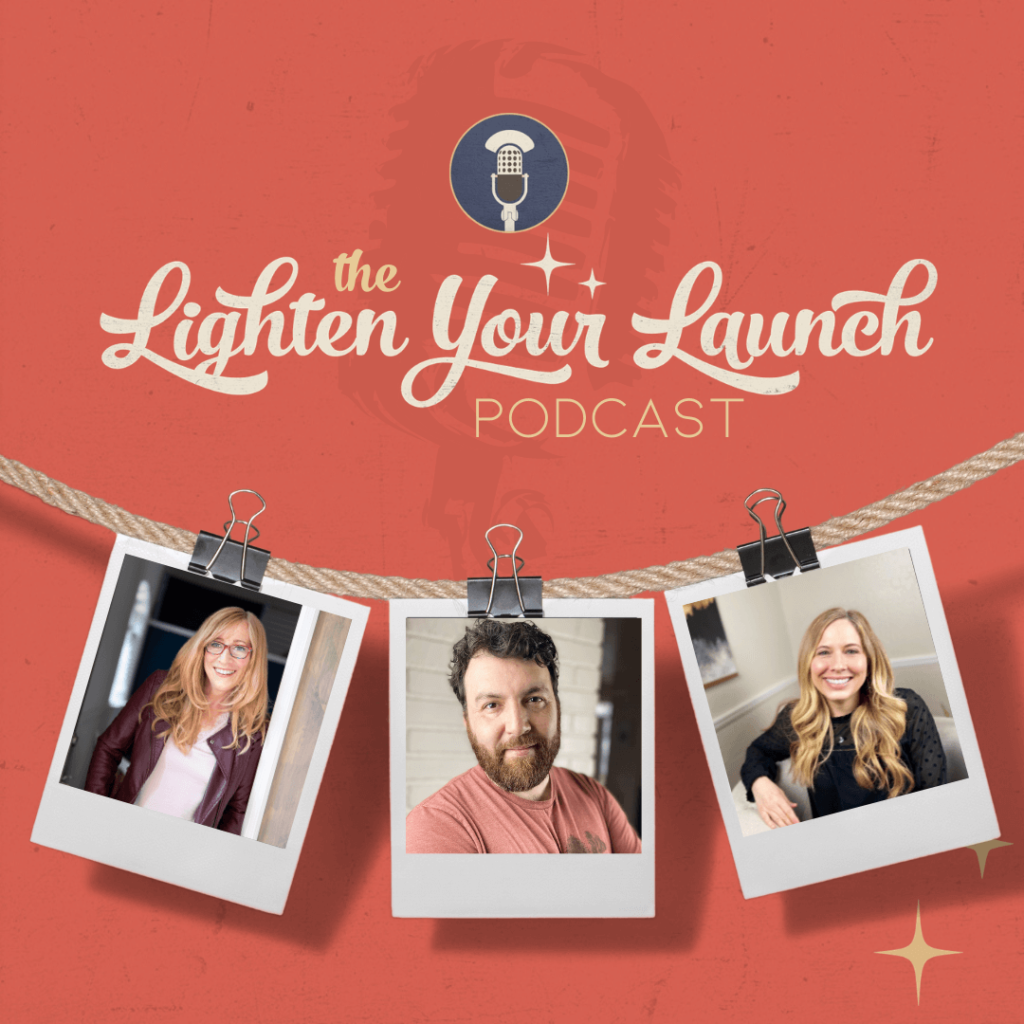


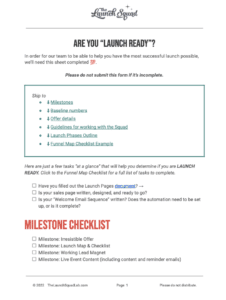
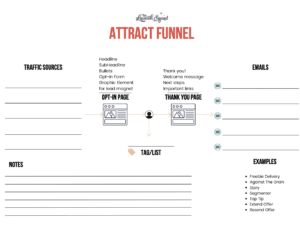
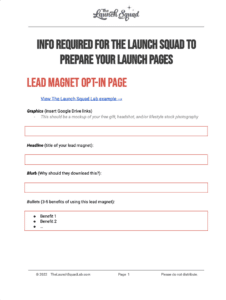

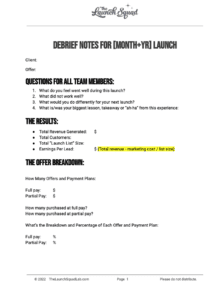
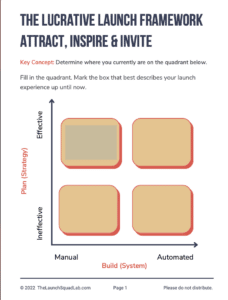
![Marketing Launch Calendar [TEMPLATE]](https://thelaunchsquadlab.com/wp-content/uploads/2023/05/Marketing-Launch-Calendar-TEMPLATE-300x260.png)
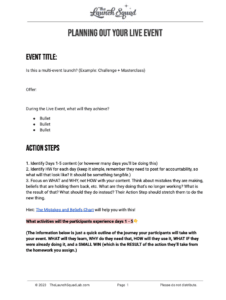

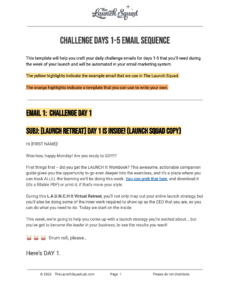
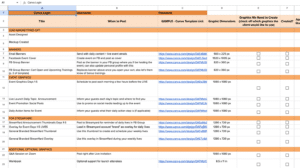
![[Updated] Email Templates for Launch](https://thelaunchsquadlab.com/wp-content/uploads/2023/05/Updated-Email-Templates-for-Launch-223x300.png)
![[REVISED] LS Pitch Script](https://thelaunchsquadlab.com/wp-content/uploads/2023/05/REVISED-LS-Pitch-Script-2023-226x300.png)

